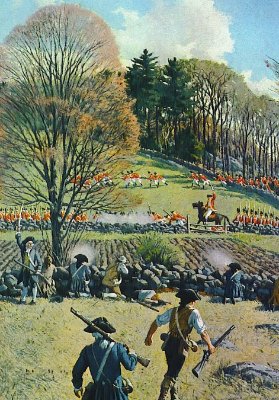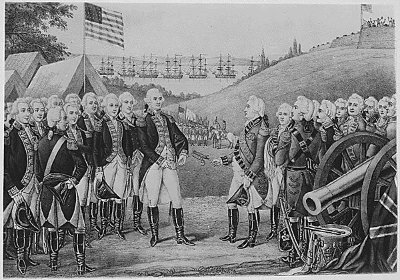July 3, 2001
After reading my article last week on ‘What The Military Can Teach Us About…Getting Things Done’, a friend joked that this week (being a Brit) I should write about ‘what we can learn from the British losing the American War of Independence’ – we both laughed (him more than me) but later on I thought ‘why not?’. Better than writing about soccer.
Now that I am a dual UK/US citizen (he says quickly) perhaps I can claim a less biased position on the topic and so, with the help of our eldest son (they don’t go into much detail on the War in British schools), I have come up with a short list of why the British lost the War of Independence and what lessons this highlights for businesses. Feel free to add yours in the comments section below:
Environment. The American forces better understood the terrain and used it well, with innovative guerrilla tactics - necessity being the mother of invention. The colonists also had the support, the ‘hearts and minds’, of the majority of the population.
How well do you know your marketplace? If you spend more time in the office than with clients the answer is most likely ‘could be better’. Also, is your company liked and admired or are your customers looking for an alternative for 'emotional' reasons? The market dynamics (and war) that led to the creation and success of Virgin Atlantic and other Virgin companies are good examples of this. Some of the 'guerrilla' tactics employed over the years by Richard Branson may also have resonated with the colonists!
Focus. The British were fighting multiple wars on multiple fronts across an ocean and were unable to focus the right political, financial and military resources in pursuit of victory.
In 1985 Jack Welch wrote to shareholders that GE would be "No. 1 or 2 in every endeavor so as not to waste time, money or talent on businesses that can never be big hits." Arguably going too far (see note) but the logic and clarity of this strategy was a strong rallying cry for GE for years. As individuals we should also remember that, in the words of Publilius Syrus, “to do two things at once is to do neither". Note: the later ‘refining’ of GE's 'No 1 or No 2 strategy' came out of a GE brainstorming session with young up-and-coming Lt Colonels at the U.S. Army War College.
Supply Chain. The British were unable to properly supply their army as Cornwallis’ supply lines became ever more stretched and harassed by the colonists, leaving his force pinned down at Yorktown and surrounded by the French navy.
Most businesses have supply chains, some very complex. All companies have supply chains if financial and information supply chains are included. Outsourcing, off-shoring, Lean methodologies and greater risks from natural hazards and regulatory non-compliance have left today’s supply chains more fragile than ever. Supply chain risk management and resilience are coming to be seen as a competitive advantage rather than a cost of doing business.
Partnerships. 'The enemy of my enemy is my friend'. French involvement in the War was decisive; bringing naval firepower and military supplies, and forcing the British to fight on more than one front. The American victory at Saratoga Springs was pivotal in this 'partnership' as it gave the French confidence that the war was winnable.
Partnerships can unlock huge value and are more important than ever in today’s economy. But partnerships are hard. Are both parties fully committed with goals that are strategically important to both? Do both benefit just as much by taking on the competition together? If not it may be just an expensive press release. And look aggressively for an early success, however small, tipping from momentum to inertia can happen quickly and silently in a partnership that does not show early results.
Purpose. The American colonists showed more tenacity and resilience, partly due to the leadership of George Washington but mainly because they had a strong purpose. They were fighting for their independence; whereas British leaders were divided on the strategic and economic rationale of the war.
What is the purpose of your company or division? Is everyone on the same page or divided in their understanding and support of the mission? Dan Ariely speaks compellingly about the importance of ‘purpose’ in our work and why money (and even joy) are not enough.
Hubris & Arrogance. Many of the above challenges and mistakes were caused or exacerbated by hubris and the level of arrogance in much of the British leadership.
The role of hubris and arrogance in the downfall of once great companies (and empires) is a central theme of Jim Collins’ excellent book ‘How The Mighty Fall’. The military played a role in inspiring the book; senior military officers being part of the group debating ‘is America renewing its greatness, or is America dangerously on the cusp of falling from great to good?’ that was the catalyst for Jim’s book. If you work for a ‘great’ company or are looking for one to displace you should read this book. Note also the sub title 'Never Give In'.
The next time you are in a meeting and someone says “we’ve always done it this way” or “but we’re No 1 in our market” or “who else would they buy from”…..imagine you are standing in open ground in a bright red tunic and there is rustling in the bushes.
Happy July 4th!
Postscript
Businesses can learn much from the British defeat (and many other military defeats throughout history - insert 'Romans' for 'British' and 'Hannibal' for 'Colonists' and 'Cannae' for 'Yorktown') - but did the British learn from their defeat?
In the aftermath of the War the British repealed the Irish Declaratory Act while granting full legislative independence but efforts at deeper constitutional reform failed. Britain focused its expansion towards colonies in the Caribbean, Africa and India, building up what has been called the ‘Second British Empire’, which eventually became the largest dominion in world history. But the rise and fall of that is for another day.
I can’t help but think of another, more recent, military campaign that the British fought across an ocean (well, two) with mixed political support and fickle international opinion - the Falklands War in 1982. On this occasion Britain was successful with many of the factors listed above swinging in Britain’s favor: strong political leadership from Margret Thatcher, strong and consistent outreach to international partners (persuading the French not to get involved this time…with help from Britain’s ally, the US - I guess the Brits did learn something over the years), excellent understanding and use of terrain (turns out Wales and The Falklands are almost identical) and superior training and tactics employed by a professional volunteer force - this time it was British Special Forces who were shooting from the bushes. And there was purpose; Britain was fighting for the freedom of Falkland Islanders who had voted to remain British citizens. The parallels, opposites and ironies are striking.


